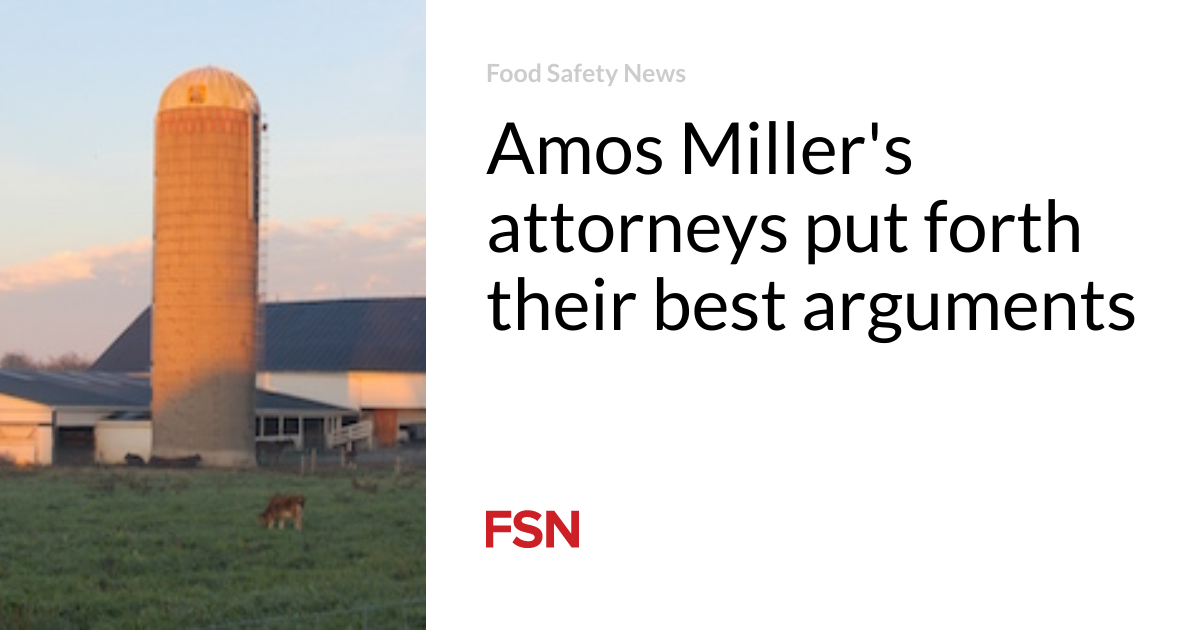Food
Amos Miller’s lawyers presented their best arguments

Pennsylvania Department of Agriculture v. Amos and Rebecca Miller moves in the Court of Common Pleas of Lancaster County, Pennsylvania.
In the latest round of arguments, the Millers’ attorneys, Bradford L. Geyer and Robert E. Barnes, presented their views on what the Pennsylvania Department of Agriculture (PDA) is trying to do to the Millers. They produce and sell unpasteurized, raw milk and other agricultural products found to violate state law.
It’s not something the state is likely to agree with, but it does show how far apart the Millers and their state are.
“The PDA is asking this court to do exactly what the court told all parties and the public the court would not do: usurp legislative power and change the law,” the defense begins. “The PDA goes even further: It also requires the court to amend the U.S. Constitution. The court has already rejected this same argument from the PDA in their opposition to Defendants’ motion to amend, and they cite no new fact or argument to reverse the court’s decision.”
“The PDA seeks permission from this court to usurp both Congress and the state legislature,” the report continues. “The law is clear: it only applies to sales to Pennsylvania customers within the state. In contrast, the language the PDA wants to add – “of the Commonwealth” and “regardless of where customers live” – does not appear in the statute. It could also not exist constitutionally.”
“The food laws regulate access to customers in Pennsylvania because that is what the Legislature chose and what the Constitution allows them to do; the laws do not regulate the producers, processors, or possessors of food intended for export to markets outside the state,” it states. “Consider the absurd devastation wrought by the change in law that the PDA is asking this court to make – anyone traveling through Pennsylvania with food intended for sale out of state is now subject to the jurisdiction and restrictions of the PDA so that anyone traveling from West Virginia through Pennsylvania to another state with food intended for sale outside Pennsylvania may be stopped, searched, seized, fined, ordered, penalized and jailed. Food production, processing and transportation facilities for export outside Pennsylvania – which employ thousands of people in Pennsylvania – would now be banned overnight and awaken criminals. This is not what the legislature authorized, nor what the Constitution allows. Contrary to PDA’s claims, food intended for export is already regulated by Congress, as evidenced by defendants’ fifty years of lawsuits.”
“The PDA goes even further: it would redefine the word ‘sell’ to include merely ‘exchange’ or ‘delivery’, regardless of intent to sell or actual sale… so it goes on. “The PDA bill would make every potluck meal, every Thanksgiving lunch, every Christmas dinner, and every Easter brunch illegal in Pennsylvania. This is precisely why the legislature limited the scope of the law. Secretary of Agriculture Redding may think the Legislature has given him the power to be Pennsylvania’s Food Pope – no one can eat food anywhere until and unless Pope Redding blesses it first – but the Legislature has done no such thing, and that is not constitutionally possible.
“The PDA asks this court to create a new law that would also violate the Supremacy Clause, the Commerce Clause, the Right to Travel Clause, the Privileges and Immunities Clause, and the Due Process Clause of the United States Constitution. The Fourth and Fifth Amendments prohibit state seizure of property without due process, probable cause, or just compensation. The right to travel, privileges and immunities, and the due process clause ensure access to traditional foodstuffs essential to health and consumed with the informed consent of a willing consumer. The authorized scope of the PDA’s police power is to protect Pennsylvania consumers with respect to Pennsylvania-made products, and not protect Tennessee consumers from themselves.
The PDA would criminalize all those who produce, process or possess food intended solely for export to markets outside the state. People produce, process and possess food products without PDA licenses at Pennsylvania farms, processors, shippers, transporters and distributors for daily exports. PDA would make them all criminals simply because the food product is ever within the borders of Pennsylvania. Congress regulates interstate commerce, not the PDA. The Constitution says so. The FDA takes precedence over the PDA, and the PDA may not play the FDA or replace the FDA if the PDA does not like the law; appeal to Congress, not the courts.
Defense attorneys also say, “Notably, PDA testing did not reveal e-coli, and the nation’s top raw milk safety expert testified at the hearing that defendants’ raw milk products were safe for human consumption. Despite extensive testing, invasive surveillance, and access to a global database, the PDA was unable to provide a single witness who consumed the defendants’ food products to testify otherwise. As every PDA official admitted on cross-examination, not a single customer of the defendants has ever complained about any of the defendants’ food products, despite the millions of food products distributed to tens of thousands of Americans over the decades. The only harm would come from people being denied access to Defendants’ products.”
Attorneys for the Millers also quote RFK Jr. and Congressman Thomas Massie to support their clients.
Robert E. Barnes, a Los Angeles-based attorney, said the Amos Miller case could spend two or three years in state courts.
(Click here to sign up for a free subscription to Food Safety News.)













